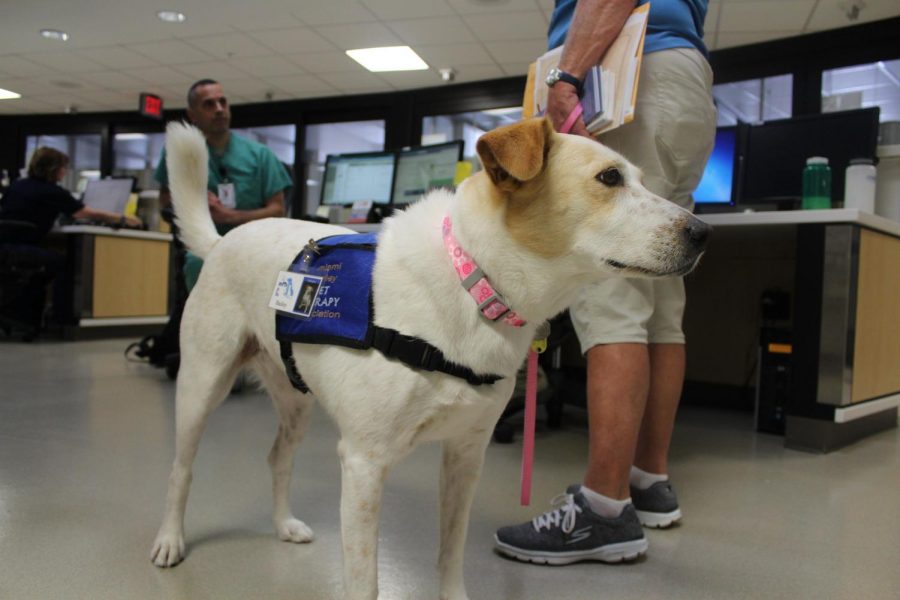Moran: Lying About Emotional Support Animals Makes It Harder For Those Who Actually Need Them
Bailey, a five-year-old pet therapy dog from the Miami Valley Pet Therapy Association. (Photo by Stacey Geiger | Courtesy Wright-Patterson Air Force Base)
January 23, 2020
Animals have been used to service humans for centuries, but the use of dogs for therapy has only been developed within the past couple of decades. To obtain a service dog, a person needed to have a distinct disability present or visible. These dogs are meant to help people with disabilities such as blindness, epilepsy or other physical incapabilities. With the somewhat recent emergence of mental health care, a new role for dogs as emotional support animals has come into play.
While both mental and physical health are equally important, there has been an increasing number of people being dishonest about needing an animal for therapy. The reasons for lying about these animals are varied (some people want to travel with their pet or move it into no-pet housing). But it is critical that people are truthful to avoid creating a stigma around therapy animals that discredits those who are in legitimate need of an animal’s assistance in their day-to-day life.
This state legislative session, Utah legislator Marsha Judkins has filed a bill that pushes for increased acceptance of therapy animals and the use of them by those in need. Rep. Judkins has recognized the benefits of therapy animals and the importance of having them welcomed into many areas where other animals typically shouldn’t be. Judkins’ bill “celebrates” the human-animal bond and will help the people who need assistance continue their life as normally as possible.
One thing many people fail to realize is the differences between a service animal, a therapy animal and an animal used for emotional support. A service animal is most likely what people first think of, and they are used in a large variety of situations. Some dogs help with seizures, others help with mobility and autism, and there are even dogs that help with medical alerts. These dogs are typically allowed in more places, though there may be occasional exceptions depending on the safety and sanitation quality. A therapy animal also helps in a variety of ways. Therapy animals, usually dogs, are used in physical or occupational therapy, often in hospitals or nursing homes with the main goal of helping patients feel comfort and affection. Then come emotional support animals (again, typically, though not always, dogs).These animals help their owners with severe mental disorders, such as depression, anxiety or panic attacks.
Many people in Salt Lake City are living in an apartment building rather than a house, making it harder for them to obtain and keep pets. Rent is already overpriced, and the extra fees for an animal are unmanageable for many. I believe this has partially motivated the lies about needing an animal for therapeutic reasons. But while it is easy to claim to need one, there is a lot that goes into the training of these animals. There are also people who rely on them, so it is important to not claim to need one if it is not true.
This has become a prevalent enough issue that the Utah House passed a bill in 2019 that classified lying about the need for an emotional support animal as a misdemeanor. (This same bill also protects those who can prove they need an animal by not allowing landlords to charge more fees for the animal.) While lying about a service animal is only a misdemeanor in Utah, there are several other penalties that a person could accrue for falsely claiming an emotional support animal. These penalties vary from state to state, and may include fines, community service or even jail time.
There is no denying that mental health is equally as important as physical health. And there is a need for emotional support dogs just as there is a need for service dogs. Mental health is increasingly valued, but there may be many people that claim they need an emotional support dog and are not taken seriously. To obtain an emotional support dog, or to claim an already owned pet as one, start by talking to your doctor.
Therapy animals are great, but we should not lie about having or needing them. There are legal ways to obtain each type of animal, and we should abide by those laws to keep the dogs used for their intended purpose. The different bills being passed are a step in the right direction, but we still have a long way to go.







